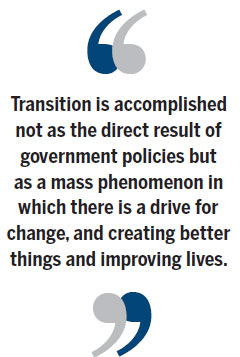Entrepreneurship is the missing ingredient
Updated: 2014-07-25 08:44
By Ed Zhang (China Daily Europe)
|
|||||||||||

Economic transition needs more than government policies
For a long time, many in China have talked about how the country's economy is in transition, but the definition of that depends on whom you talk to.
Some said China's development is achieved partly by getting statistics to do the right thing and partly by policies that help whichever industries the government happens to like. Those who advance this idea differ on the relative proportions of each of these ingredients. Some say the split is 50-50 and others put it at 40-60 or 30-70. Whatever the proportions may be, the view is simplistic because it takes no account of entrepreneurship and competition.
Of course no real development could occur that way, as anyone with a basic sense of economics knows, let alone a transition that features higher productivity.
A realistic definition of development, as well as of economic transition, must take account of the central role of entrepreneurship. Transition is accomplished not as the direct result of government policies but as a mass phenomenon in which there is a drive for change, and creating better things and improving lives.
This second, entrepreneurial definition was reflected in one of Premier Li Keqiang's recent meetings with business leaders. They told the head of the cabinet that, despite the adversities their companies have experienced since the 2008 global financial crisis, they do not want, nor do they need, any special government policies to help them.
That was the message from Dong Mingzhu, chairwoman of the Gree Group, one of China's most competitive manufacturers of home appliances, and Liu Yongxing, chairman of perhaps the largest feed producer in the country. They just demanded their right to compete with other (and implicitly state-owned) companies on an equal footing. What they need, they said, is fair competition.
This environmental approach is in stark contrast to the modus operandi of many government offices (and hence outside observers), in which the government habitually comes up with this or that policy to promote or protect designated industries or businesses.
A common mistake is that this sort of target-specific political favoritism is often lumped together with the policies designed to provide largely indirect impetus to a broader range of activities, such as modernizing public infrastructure.

These two kinds of policies are both called industrial policies. Liberal economists tend to dismiss them wholesale as the evil of government interference, and Chinese officials tend to use them interchangeably as equally necessary for generating development.
But obviously, for entrepreneurs, there are good industrial policies and bad ones.
Good industrial policies are those that clear away obstacles to fair competition and help promote, usually indirectly, broader business activities.
Policies made under the target-specific approach are often bad ones, even though they can temporarily boost sales, because they end up distorting competition and stifling entrepreneurship.
Policies tailored to hold up specific industries or, even worse, specific types of businesses, used to be rampant in China whenever business slid into a down cycle. By then, the strongest industrial lobbying came from the largest state-owned corporations that claimed strategic importance.
As favorable policies were dished out to the so-called strategic industries and corporations, sometimes wastefully and recklessly, other industries and companies could find themselves worse off, having even more limited access to the resources needed for their survival.
In fact, much of China's problem of industrial overcapacity was a creation of the massive financial bailout that the government introduced after 2008. Now the government has to spend another huge dollop of public funds to dismantle the overcapacity it built up just a few years ago.
The demand by business people for fair competition reflects an urgent task for the government -relinquishing its unnecessary approval powers, also cleaning up the mess from all its past industry-specific or enterprise-specific policies that good businesses do not want and all despise.
Seen this way, one may also realize that China's transition is not just one from an economy driven more by physical input to one underpinned more by skills. More importantly, it will have to be a transition from allowing a bit of entrepreneurship to accommodating a lot more of it.
The author is editor-at-large of China Daily. Contact the writer at edzhang@chinadaily.com.cn
(China Daily European Weekly 07/25/2014 page12)
Today's Top News
TransAsia crash while landing in Taiwan
UK fraud office liaising with China on GSK bribery case
Death toll in Gaza mounts to 701
Meat supplier in global crisis
Dogs 'capable' of feeling jealousy
Five detained over stale meat scandal
5 more universities set up human rights centers
Rebels likely downed jet 'by mistake'
Hot Topics
Lunar probe , China growth forecasts, Emission rules get tougher, China seen through 'colored lens', International board,
Editor's Picks

|

|

|

|

|

|





